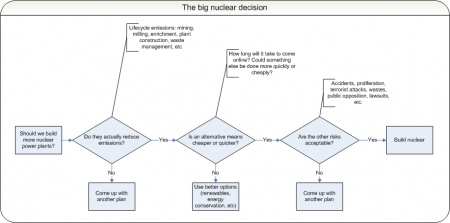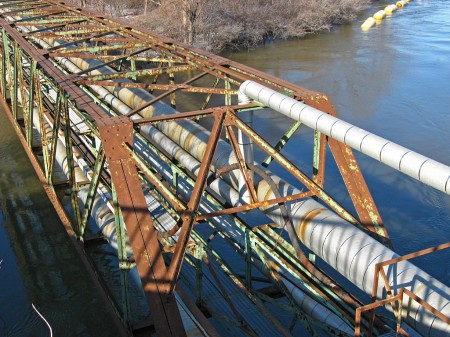Nassim Nicholas Taleb‘s The Black Swan: The Impact of the Highly Improbable is an unusual, excellent book with broad applicability. In particular, those concerned with finance or the use of mathematics in social disciplines (politics, economics, international relations, etc) should strongly consider reading it. They will probably find it uncomfortable – as it demonstrates how their ‘rigorous’ disciplines are built on sand – but they will be wiser people if they can accept that.
Taleb’s main point is that life is dominated by improbable events of huge consequence. This is obscured to us for a number of reasons: not least, because we are able to look back and construct plausible after-the-fact stories about why things turned out the way they did. Because we fail to appreciate how explosively improbable the world is, we leave ourselves far more vulnerable than our predictions suggest. Indeed, the biggest thing Taleb attacks is the very notion that we can make good predictions about the future. ‘Black Swans’ are those improbable events of massive consequence which we are able to rationalize after the fact, though we could not have predicted them before. They can be negative (the sudden collapse of a bank) or positive (the amazing success of an obscure book). They relate to the way in which the world is skewed towards extremes when it comes to things like income or the importance of a publication.
Taleb’s book consists of an odd combination of anecdote, mathematics, scholarly and literary references, personal history, and diatribes. Throughout, one has the impression of engaging in conversation with an unusually fascinating fellow – albeit one who takes special pleasure in cutting down those who disagree with him (the text ignores no opportunity for mocking and insulting economists and financial analysts, in particular).
The lessons Taleb says one should draw from an appreciation of Black Swans are noteworthy and sensible. First, we should maximize our chances of getting lucky and finding a positive Black Swan. In investment terms, that means making lots of small bets on long shots that might really pay off. In life more generally, it basically means trying new things – visiting the restaurant you never normally would, going on the blind date, seizing the opportunity to meet with the big shot publisher to explain your book idea. Second, we should minimize our exposure to negative Black Swans that can wipe us out. That means definitely avoiding standard financial instruments like mutual funds, distrusting any risk assessment based on the bell curve, and appreciating that blue-chip stocks might collapse despite decades of steady growth. His overall financial prescription is to put whatever you are unwilling to lose in US government bonds, while using the rest to make long-shot speculative bets.
It would be very interesting to see Taleb’s ideas applied directly to International Relations (the capital letters mean ‘IR the discipline’ rather than IR the phenomenon) or climate change. Within IR, there are a few dissenters who appreciate just how inappropriate all the statistics and quantitative methods being trotted out really are. They would find Taleb’s book to be confidence-boosting, whereas the number obsessed IR scholars concentrated in the United States would probably respond to it with as much anger as hedge fund managers.
When it comes to climate change, the Black Swan idea seems relevant in several ways. First, it creates a healthy scepticism about projections: whether they are for economic growth, greenhouse gas emission levels, or greenhouse gas reductions associated with certain policies. Secondly, it reveals how fallacious it is to say: “Humanity muddled through so far, therefore we can handle climate change just like any previous crisis.” Thirdly, it sheds light on scenario planning in the face of possible disastrous outcomes with unknown probabilities attached.
It is safe to say that anybody interested in how history is written or how people try to come to grips with an uncertain future will find something of value in this text. At the very least, the colourful asides provide plenty of mental fodder. At the very most, appreciation for Black Swans might significantly alter how you live your life.






